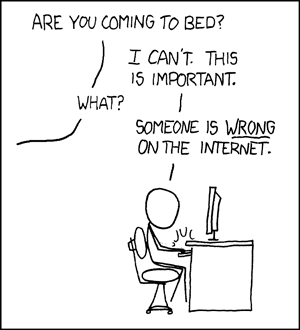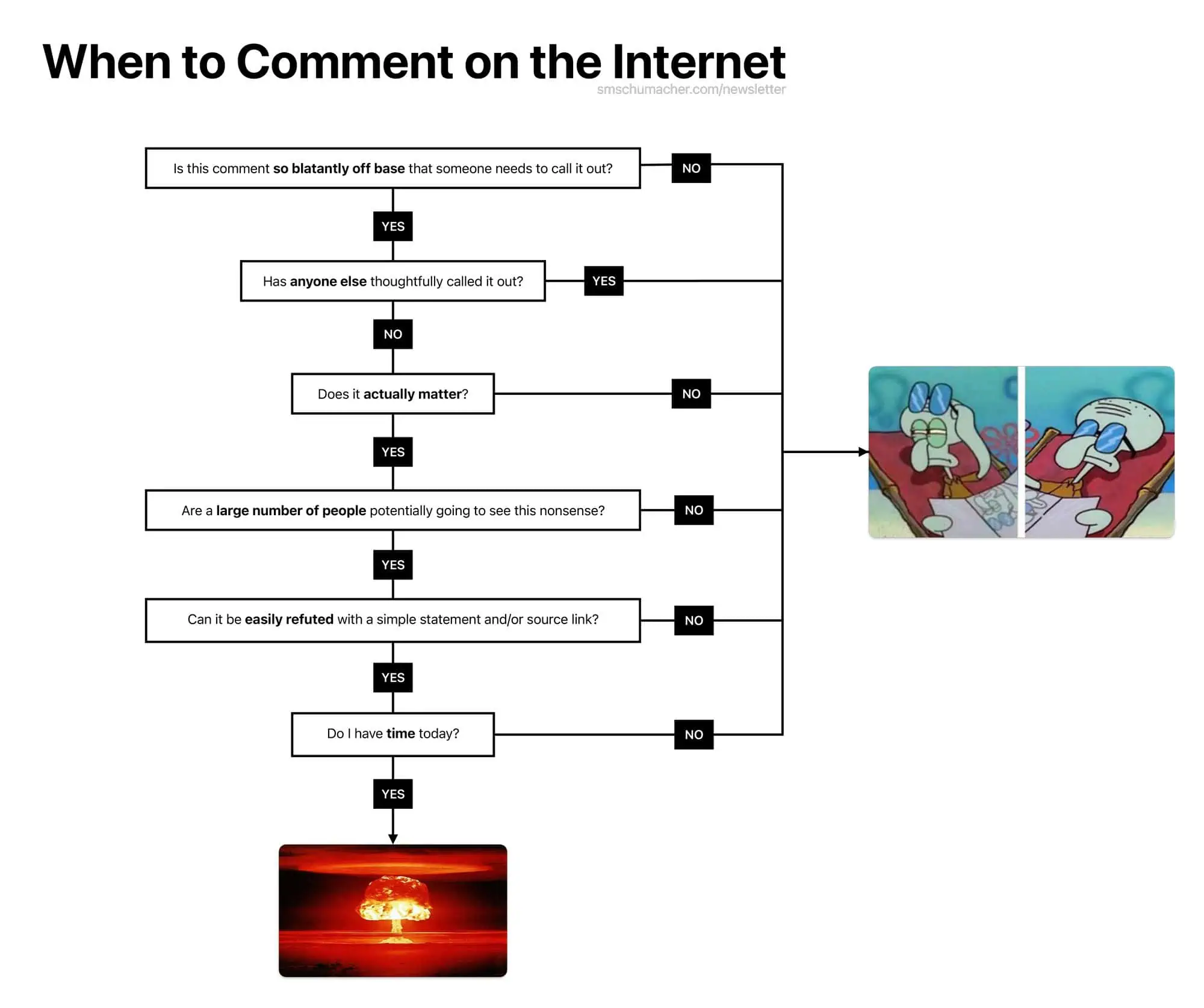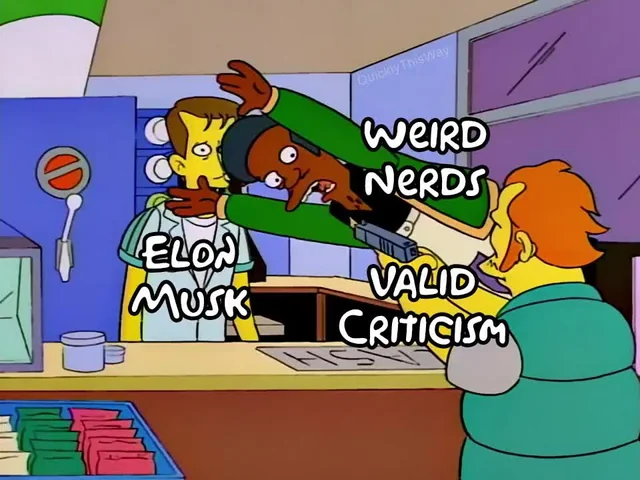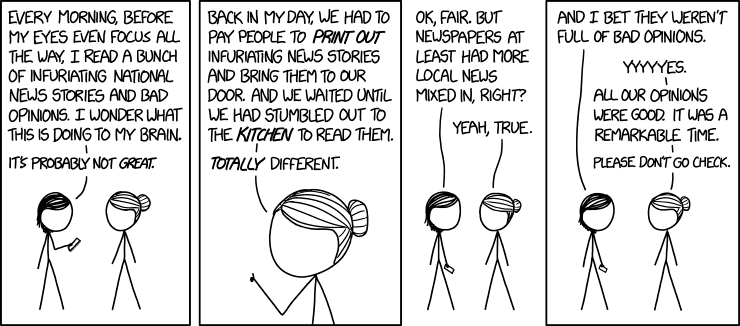March 7, 2025
The Art of Decision Making When Faced With Internet Nonsense
Social discourse is currently a tire fire in the landfill we live in. Online, people pontificate about each new daily horror, often in unhelpful ways.
While discussing this unholy reality with a friend this week, I accidentally mapped out my decision-making framework on being a Person On The Internet™. I thought my perspective might be helpful to share if you also have the misfortunate to read Internet trolls so mind-numbingly stupid it takes every ounce of self-control not to throw a chair through a sliding glass door.

“I don’t argue with strangers on the Internet.”
Welp, that’s it. Thanks for coming folks.
…
OK, for real though, this has been my cardinal rule for years. I simply don’t argue with people online. It’s not a judgment on people who do, and I love me a good troll (thank you for your service, chaotic good). It’s simply a personal decision about what is right for me, individually.1
I have shared this statement with people before, but this week I realized it’s actually a bit more nuanced.
My friend pointed out that dumbasses are empowered by inaction, and even though they likely won’t be convinced by a differing opinion, they need to be reminded one exists.2
Commenting to state the facts or share a different viewpoint is important for the silent viewers who might not have an opinion at all. It’s the Internet equivalent of putting up a blue sign in a red county.
As a result of this conversation, I ended up making my previously subconscious mental checklist into this handy flowchart.

This process is for divisive statements online, such as the calculated dismantling of the American government, or whether you should add milk or cereal to the bowl first.
Let’s get into the nuance.
If I have time to be the first person to easily refute the high traffic off base comment, one of several things will happen:
- Nothing
- An Elon yes-bro will throw himself into the thread
- Someone will respond with a new angle or ask for clarification
For 1 and 2, I do nothing. This is the “don’t argue with strangers on the Internet” part. However, if someone thoughtfully engages, I will respond.
Define “stranger”
For the sake of keeping things simple, let’s assume there are only two types of strangers. One is dogmatic, enmeshed with their identity, and has no interest in actually hearing anything that might disprove the deeply held beliefs they acquired yesterday from a podcast.3
However, the second type of stranger is genuinely curious, or has something valuable to add; a different perspective, another level of nuance. The kind of thing that used to happen on the good Internet before people lost their minds.

The ‘When to Comment’ flowchart in action:
Situation 1
A few months ago, someone on LinkedIn shared some business-related fluff post about Elon Musk easily getting a billion bucks from someone for his Twitter bid.
Anyone using Musk as an example of good business decisions really irks me.
Call me old-fashioned, but I simply don’t believe that throwing away one of the world’s most recognizable brands, mass firing staff, refusing to pay your bills, deciding to spontaneously move servers with no advance planning and telling your main drivers of revenue to go f*ck themselves are good business decisions.
Anyway, I commented that since his purchase of Twitter it had lost 70% of its value and linked to a report about Fidelity’s downgrade (it was 79% in September). Because it’s not a lesson if the premise is false.
I ended up getting 100ish likes on the comment (I was not the only person rolling my eyes), but I also had 10 or so comments of varying degrees of:
- “ok, but”
- <insert weird sidebar>
- “YOU DON’T KNOW WHAT YOU’RE TALKING ABOUT! AND I ONLY TYPE IN ALL CAPS!”
- “All caps guy, you’re rude.”
- etc.
None of the comments had anything useful or insightful to add. I responded to the author’s comment and the one guy who replied with a thoughtful additional point that indicated he actually had some understanding of the matter.4
I laughed at the other comments and went on my merry way, because I don’t argue with strangers on the Internet.
This is why the flowchart works; no mental energy is wasted wondering how or if I should respond to the idiot behind door A, because the decision has already been made.
Situation 2
In the last week, I saw another guy on LinkedIn unironically post a comment about Elon Musk doing things because he cared about humanity, an opinion which is easily disproved by any random tweet on the man’s timeline, or any action he’s taken in the last 30 minutes.
I wanted to comment “Imagine being this bad a judge of character.”
I did not. It didn’t matter, and I didn’t care. Also, as fun as it would be, I’m not a troll.
And that’s the last thing I want to add; everything I’ve written here comes from a deep understanding of my own personality and how I want to show up in the world.
The questions in the flow chart might be handy, but it’s important to start with the core of who you are. If you’re someone who has the patience and compassion to thoughtfully educate ignorant people, maybe you should use that gift.
How do your core values show up in your online presence? If social media has been stressing you out, have you thought about setting boundaries?
It is nonstop five alarm fires out here, and if a single badly timed headline can destroy your day, you don’t want to know what the comments can do. Think about what your own personal flow chart might look like.
Then let’s go one step further: ask yourself what you want to get out of your social networks, and in some cases, if you should even be on them at all. This is not the time to bury your head in the sand, but we need you to take care of yourself too.
Book Recommendations:
Footnotes:
1 Seriously, why would someone choose to become emotionally invested in a random Internet stranger? Your own family isn’t enough?
2 Remember, people with the most extreme views are typically the most vocal.
3 People form their beliefs based on emotion and personal biases first, then they find intellectual reasons to justify them. Humans are not rational.
4 I was on Twitter before/during the shakedown, watched the entire acquisition happen in real time, and I’ve read two separate books on it.


